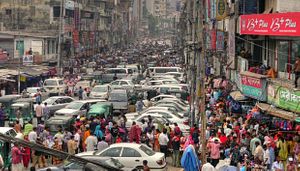Barely a month after the anniversary of Bangladesh’s 2014 election, which returned Prime Minister Sheikh Hasina and the ruling Awami League to power, political violence continues to spread, mostly by way of drive-by attacks on passenger buses. On Thursday morning, arsonists hurled firebombs at a truck in the northern city of Bogra, destroying the vehicle and killing four. That attack came after seven died in a pre-dawn blast on a parked bus in the capital of Dhaka on Tuesday. Police pinned the bombing on opposition Bangladesh National Party (BNP) leader Khaleda Zia and 56 other opposition activists. The State Department has also denounced the ongoing violence.
The BNP, exiled from political life since boycotting last year’s poll, has demanded a national transit strike to force new elections (the next vote isn’t scheduled until 2019). Zia opted to remove her party from the race after Hasina refused to install a caretaker government to oversee the vote, a common practice in Bangladesh for nearly two decades. Many top opposition figures remain in prison or exiled, including Zia, who has been holed up in her Dhaka office by a police blockade since violence broke out on January 5, which BNP marked as “Democracy Killing Day.” This year’s spate of violence has led to more than 50 deaths and the arrest of more than 10,000 opposition activists.
Even if there is another poll, whether it takes place now or in five years, Zia, facing a daunting rap sheet, may be barred from running. Her popularity has taken a hit: thousands of students, organized by a teacher’s union, showed up on her doorstep yesterday morning to protest BNP’s disruptions. Police have taken drastic countermeasures in to clamp down on bombings and unrest, banning motorcyclists from carrying passengers, and use of smartphone messaging service Viber, popular among opposition demonstrators.
But those are symptoms, not causes of violence. Though Bangladesh has seen relative peace since election violence fizzled out last year, corruption remains endemic. Both Hasina and Zia have served jail time on bribery charges in the past decade. Bangladesh ranked 145 out of 177 countries in Transparency International’s Corruption Perceptions Index in 2014.
Competition at the top levels of politics is non-existent. Hasina has led the Awami League since 1981, while Zia has controlled the BNP since 1984, and for the past twenty-four years, the rivals have traded turns in office. Negotiations between the two parties remain stuck in a rut. Zia counts Jamaat-e-Islami (JeI), an Islamic fundamentalist party under investigation for war crimes, as a key coalition ally. Hasina has refused to engage Zia as long as it courts the Muslim group, which counts Persian Gulf elites among its donors.
Like last year’s violence, this run of bombing won’t last forever. But the attacks put more black marks on Bangladesh’s tarnished image, and will hamper growth and foreign investment for the time being. A country defined by power struggles is hardly a safe bet.

































